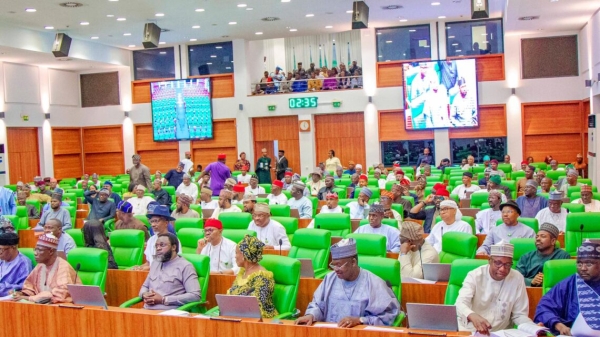A video featuring House of Representatives member, Ahmad Satomi, has gone viral on social media.
The representative of Jere Federal Constituency, Borno State, challenged the Green Chamber regarding the recently passed National Anthem bill.
Satomi questioned the bill’s relevance to Nigeria’s pressing issues, sparking widespread discussion and debate.
The House of Representatives on Thursday passed for a second reading a bill seeking a return to the old national anthem, PUNCH Online reports.
Leading the debate on the general principles of the bill, the sponsor of the proposed law, Julius Ihonvbere, anchored his argument on the need for patriotism and nationalism.
But many Nigerians on social media questioned the relevance of the move, wondering if it would help salvage the nation’s economy, being Nigeria’s biggest challenge at the moment.
In the video, Satomi addressed his colleagues, questioning the practicality and impact of the bill, which mandates reverting to the old National Anthem, “Nigeria we hail thee.”
His concerns highlighted the disconnect between legislative actions and the real-world problems faced by Nigerians.
“I do not know how this national anthem will affect the well-being of the common man in Nigeria. Let’s be realistic.
“How will this support either hunger, banditry, or improve insecurity?” Satomi asked.
He emphasised the need for legislation that directly benefits the populace, rather than symbolic gestures.
Satomi urged his colleagues to prioritise development-oriented policies that would attract positive international attention and foster growth.
He expressed frustration over the focus on the national anthem while the world advances in technology and innovation.
“There is a saying that goes thus, ‘Countries that rely on prayers will rely on the ones that do think.’
“Please, let’s think of something that will bring progress, stability, and prosperity to the economy of this nation and improve the lives of the common man,” he urged.
Despite his objections, the House of Representatives, on Thursday, May 23, passed the bill with accelerated consideration.
The bill’s passage has sparked debate among the public and lawmakers about legislative priorities amid the nation’s ongoing struggles with hunger and insecurity.
[Punch]

